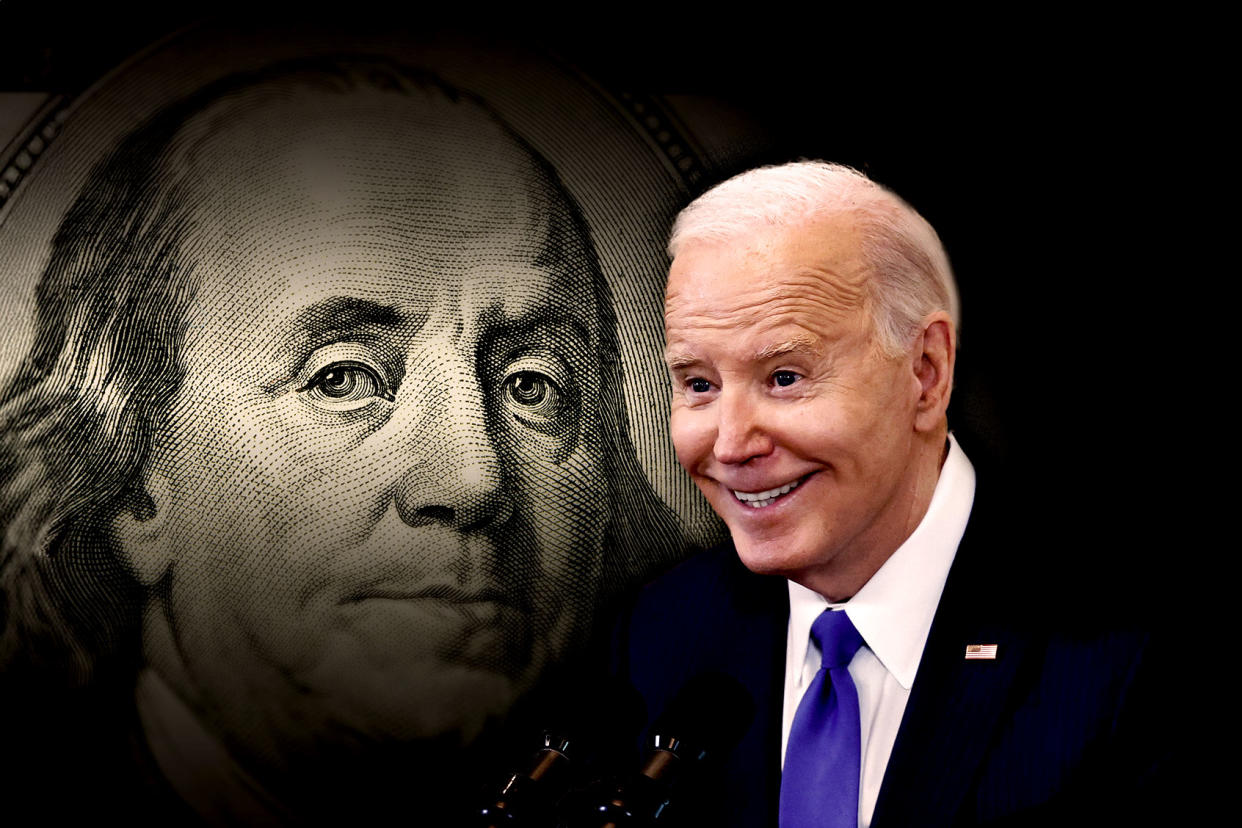Money in politics: The unlikely hero of the 2024 election

- Oops!Something went wrong.Please try again later.
- Oops!Something went wrong.Please try again later.
In the mostly forgotten 1990 film "Crazy People," Dudley Moore's character, an advertising executive, has a nervous breakdown and starts creating brutally honest ads. "Volvo," one reads. "They're boxy, but they're good." It's a funny scene, but it also taps into a deep-seated suspicion many people harbor: Advertising is, at its core, a form of deception – a way of spinning the truth to sell us something we don't need.
Nowhere is this suspicion more pronounced than in the world of political advertising. With its ominous music, grainy black-and-white footage, and doom-laden narration, the average political ad is often seen as the ultimate example of manipulative, truth-bending propaganda. But in the strange, unsettling landscape of the 2024 U.S. presidential election, these much-maligned 30-second spots may be the last, best hope for preserving the most precious commodity of all: the truth.
As we barrel toward the 2024 election, our country finds itself in uncharted waters. The very fabric of our democracy is under threat, and the institutions we once relied on to find the truth are faltering. The courts, meant to be impartial arbiters of the law, are slow-walking any number of 2020 election-related cases, with Trump's trials strategically delayed until after the election. And in a media landscape fractured into echo chambers and filter bubbles, the once-mighty fourth estate is no longer able to cut through the noise and hold power to account.
The stakes in this election couldn't be higher with the former president, Donald Trump, campaigning for a comeback while facing a staggering 81 criminal charges across four cases. The alleged felonies paint a portrait of a leader unmoored from the rule of law, hell-bent on power at any cost. Yet according to a recent poll conducted by veteran Democratic pollster Geoff Garin for the group Save My Country, a mere 31% of swing state voters polled have heard about Trump's most brazenly authoritarian boasts, from pledges to be "dictator for one day" to musing about "terminating" Constitutional protections.
But here's the kicker: When these same voters were presented with Trump's own words unfiltered, his unfavorability ratings shot up. Fast. After hearing some of Trump’s most outlandish statements – like his claim that immigrants are "poisoning the blood of our country," his vow to pardon Capitol rioters, and his threat to persecute the "vermin" opposition – the number of these critical swing voters who viewed him as a "dangerous" would-be "dictator" leaped by 7-9 points.
This is where the Biden team's billion-dollar ad blitz comes in. Trump’s campaign is still significantly behind Biden’s in fundraising. By saturating the airwaves in battleground states with ads highlighting Trump's own words and deeds, the Biden campaign has the potential to cut through the noise and chaos, and drive home the severity of the threat Trump poses. In an atomized attention economy, this shock-and-awe approach may be the only megaphone loud enough to shatter information deserts and shift the needle with the voters who matter most.
Of course, the political landscape can shift on a dime, and there's no guarantee that this ad offensive will be the silver bullet that saves democracy. But in a world where truth is under assault and accountability is in short supply, it may be our last, best hope for ensuring that voters go to the polls with their eyes wide open.
The very notion of political commercials as democracy's savior would have been laughable just a decade ago. In an age of relative normalcy, the art of campaign messaging was deployed to sway votes, not stave off authoritarianism. But in 2024, against a GOP standard-bearer whose contempt for the rule of law is matched only by his talent for warping reality, the old rules no longer apply.
Want a daily wrap-up of all the news and commentary Salon has to offer? Subscribe to our morning newsletter, Crash Course.
If sunlight remains the best disinfectant, then the antidote to MAGA misinformation may just be to flood the zone with a truth unimaginable in a pre-Trump era: that a major party nominee poses an existential threat to the Republic. Executed with surgical precision and emotional resonance across platforms, using his own words, a shock-and-awe spotlight on Trump's extremism could jolt under-informed voters into grasping just what is at stake in this election.
To be clear, no amount of advertising can completely reverse the tide of political polarization in our nation, and aggressive anti-Trump messaging is not entirely risk-free. But when preserving democracy hangs in the balance, those hoping to hold the line can’t unilaterally disarm just because the tools at hand are imperfect. In the scrum of the most consequential election in generations, every persuadable voter moved is a win.
And so, in a surreal plot twist, the once-derided dark art of political advertising emerges as a last-ditch savior. With truth under assault and accountability seemingly non-existent, a billion-dollar bullhorn sharing micro-targeted messages on multiple platforms may not be an ideal deus ex machina, but it is the one our info-siloed public square demands.
In the final reckoning, if political ads become the unlikely last line of defense for the American experiment, so be it. Because if preserving government of, by, and for the people requires turning the weapons of mass persuasion toward mass civic education, it will be a billion dollars well spent. In 2024, there is no price too steep for the truth.

